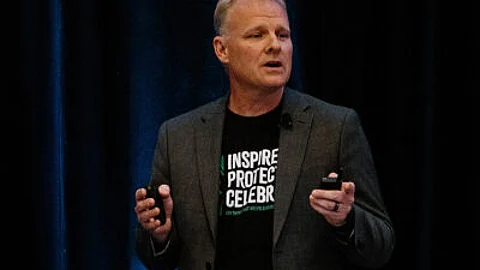

At the Bank Holding Company Association Spring Seminar in Minneapolis May 5-6, Chad Hoffman, president and CEO, Richwood Bank, Richwood, Ohio, talks about the bank’s innovative products and services that have been developed during the last 10 years.
In a field populated by big banks, online banks, credit unions and fintechs, the $1.2 billion Richwood Bank of Richwood, Ohio, has developed a path to sustained relevance through ancillary businesses designed to grow the bank. Those businesses include marketing, payroll, consulting in education and HR, wealth management, and a unique model to “sell” coffee.
It all started in 2014 as leadership of what had been a $425 million bank performed a self assessment. “We realized we looked like everybody else,” said Chad Hoffman, president and CEO. “We had grown through customer relationships, but we didn’t have what the industry would call USPs — unique selling propositions.”
Hoffman had been reading a book titled, “Blue Ocean Strategy,” which encourages companies to break out of the fiercely competitive, and focus instead on untapped markets. Of that approach, Hoffman said: “We didn’t have anything the others didn’t.”
The bank started by hiring a marketing professional who ran ads for the bank on the streaming service Pandora. Soon those ads incorporated shout-outs to customers. When customers responded positively, leadership floated the idea of charging for those spots. Thus, Richwood Marketing was born.
The bank with 201 employees now has eight full-time marketers who develop graphics, design websites, do photography and video production, and manage social media and ad targeting for some 186 clients, including 12 other community banks. Richwood Marketing has brought more than $1 million in gross receipts in its 10-year existence, Hoffman said.
To build Richwood Payroll, the bank partnered with ADP Wholesale to provide end-to-end payroll services to what has grown into 200 clients. The service has two and a half full time employees, Hoffman said, and he estimates it will gross around $500,000 in revenue this year.
“We’ll probably see a net income of $50,000, and while that doesn’t seem like a lot, what’s really cool is their balances represent $38 million in their accounts,” Hoffman explained. “And by the way, the cost of funds for those accounts are less than 1 percent.”
Richwood Payroll improves the bank’s outlook in other ways, Hoffman said. “Total loan balances these clients have is over $15 million. So profits show up in different ways.” Payroll is the kind of service that companies are not eager to change, resulting in sticky business. “They’re not going anywhere because somebody’s offering them 25 basis points more on a deposit or 25 basis points less on a loan,” Hoffman said.
While wealth management can often be an ancillary offering at many community banks, Richwood did not offer it. But the bank does now, through Richwood Financial. Wealth management for the bank’s commercial and consumer clients is expected to bring another $500,000 of net income this year. Importantly, “this raised credibility for us,” Hoffman said. “It raised financial literacy outreach and in the communities that we serve.” Richwood Financial’s two employees also manage the bank’s 401(k).
Richwood Consulting, born just this year, is an initiative the bank designed to help business customers find, develop, and retain quality employees. “We heard a lot of complaints about the lack of available talent and the talent challenges with regard to skill sets,” Hoffman said. Tapping the bank’s education department and its marketing and payroll arms, the bank created personalized programs to help other peoples’ employees improve their skills, take ownership of their responsibilities, and drive business results,” Hoffman said. The bank offers courses such as “Driving Success,” which focuses on personal and team accountability, and “Leading Change,” which focuses on navigating organizational transformation.
Lastly, the bank developed Richwood Coffee using a unique model born out of hitting a regulatory brick wall. Richwood decided to enter the coffee business the same year Capitol One opened its first cafe. But the coffee operation needed to be physically inside the bank. “A regulator told me, basically, ‘if you sell coffee, you can’t do it. If you don’t sell coffee, you can do anything you want,’” Hoffman recounted. “We said ‘challenge accepted.’”
Richwood Coffee, which now operates in six of the bank’s nine offices, opened on a donation model. Customers can get their coffee but they must “pay” by visiting a teller where they direct “payment” in the form of a donation to one of several charities the bank supports.
The bank has raised roughly $800,000 in donations through Richwood Coffee. These are funds that are deposited at the bank and, in many cases, replace donations the bank would otherwise be making in the community. “The model’s been a huge success,” Hoffman said. “People come in because they want to, not because they have to.”